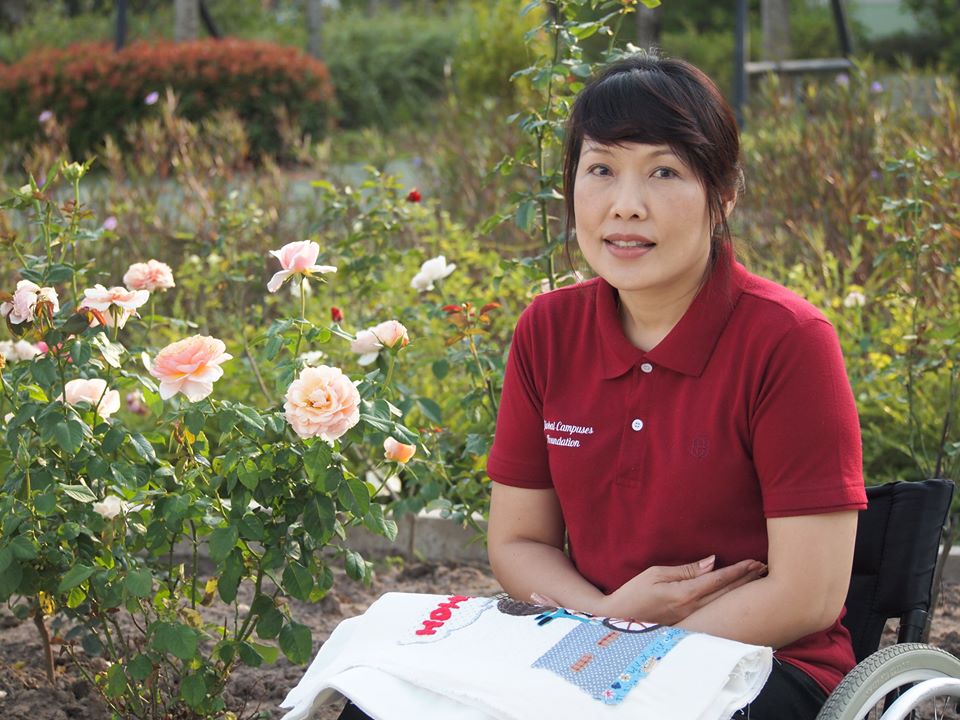Brussels/Bangkok/Chian Mai, 21 April 2020. In low and middle-income countries, such as Thailand, up to three-quarters of people with disabilities are women and girls. They face constant barriers to meaningful participation and inclusion in social settings, especially in the workplace and in decision-making roles within their families and their communities. These exclusions, barriers, and discrimination are also prevalent during the COVID-19 pandemic and in the Government’s response. Women and girls with disabilities are more likely to face increased risk of exposure to and complications from COVID-19, while they are disproportionately affected by the quarantine measures.
Nevertheless, Women with disabilities are key actors in change and should be recognized as Women Human Rights Defenders (WHRDs). Protection International talked with Katchakorn Thawisri, a Thai WHRD working on the rights of disabled people from the Global Campus Chiang Mai Foundation.

“A fellow sister defender of ours has a severe disability. She runs a grocery shop in her house, which she shares with her older mother. Before the COVID-19 crisis, her mother suffered an accident and subsequently became disabled. With both mother and daughter now disabled, they are deeply affected by the COVID-19 epidemic, in particular, given that their grocery shop is closed and they receive no business. This situation has only exacerbated the incredibly difficult conditions that they live in;” just one of the uncountable examples of how women with disabilities have been hit hard by the consequences of COVID-19.
Further issues disabled people now face under the COVID-19 pandemic, Katchakorn told us, are the current measures taken by the government, which are far from sufficient to address their needs. In addition to the monthly 800 baht (USD 25) already provided, Thailand’s government recently announced an additional 1,000 baht (USD 30) granted to those already possessing a disability card. However, this amount of money is not enough to allow disabled people to meet their entire monthly expenditures.
“Rather than addressing them as structural problems, the Thai government still regards issues of people living with disabilities as charity; which does not help people with disabilities to live independent and dignified lives within society. This is particularly true during this crisis; we are invisible to the state. Most people with disabilities are leaders and family breadwinners. When they started to earn income, they would support their families. They do not just depend on their parents or families to live. On the contrary, they are the main caregivers and supporters of the household. So under this situation, even if we are laid off as everyone else, our conditions are even worse, since we are more vulnerable and exposed to more health risks than other people,” added Katchakorn, a WHRD who also lives with a disability.
Kotchakorn further explained the impacts of this crisis on working disabled people. Most of them are employed through the Empowerment of Persons with Disabilities Act, which states that workplaces are obliged to hire one person living with a disability for every 100 workers. Most of the people living with disabilities employed under this Act are hired on yearly contracts and receive no social security. They only have access to the universal healthcare scheme. So, when the government issues compensation measures, people with disability are almost always left behind. They also do not have access to social security, since they do not receive it through their employers. As for the 5,000 baht (USD150) support for the informal workers requiring registration with the government, the conditions of who is qualified to receive this sum are not clear.
“ If they do not clearly define the scope of impacts of COVID-19, then there is a problem. If you ask who is impacted by this, the answer is everyone. The government should not choose whom they would like to support and how much each should receive. They should support everyone universally and equally. Now everyone is starting to see the effects, but in the long term the impacts will be even more visible, especially for women with disabilities who are mothers and family leaders,” says Kotchakorn, who then shared another story with us.
“There is one family I know whose mother lives with a disability and she had to take care of the children and all family members that got laid off from COVID-19. She usually has a regular income from her salary, which is not much. On the weekends she would go sell stuff at the Saturday walking street market in Chiang Mai. Now she has been laid off and the Saturday market was ordered to shut down, making it hard for this family. And now this woman living with a disability has become depressed, all the while the household expenses keep increasing. She needs to buy oxygen tanks, and now is faced with no other option but to take out loans. The expenditure for people living with disabilities has doubled because of this crisis. They are not the kind of people who just stay home, need to be fed by their parents, and wait for the government’s charity. If the country leaders have such views towards people living with disabilities, our problems would never be solved. We want the government to review current policies so that they would support people living with disabilities to access assistance and help them to survive this crisis” concludes Kotchakorn.


